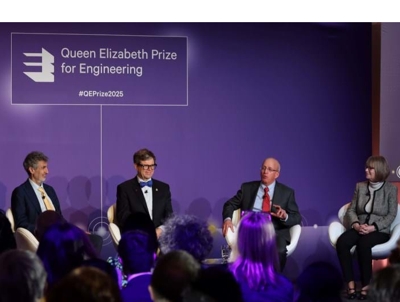| Machine Learning Pioneers Awarded Queen Elizabeth Prize |
| Written by Lucy Black |
| Sunday, 09 February 2025 |
|
The 2025 Queen Elizabeth Prize has been awarded to Yoshua Bengio, Bill Dally, Geoffrey Hinton, John Hopfield, Jensen Huang, Yann LeCun, and Fei-Fei Li. The seven 2025 Laureates share the £500,000 prize for groundbreaking engineering innovation which is of global benefit to humanity. Now in its twelfth year, the Queen Elizabeth Prize has honoured 26 engineers whose innovations have had a significant impact on billions of lives around the world. As we reported when the inaugural award was made in 2013, it is envisaged as a "Nobel Prize for Engineering" intended to promote excellence in engineering and to celebrate engineering’s visionaries. The twin aims of the prize are to inspire young people to consider engineering as a career choice, and to encourage engineers to push the boundaries of what is possible. Three of the winners (L-R), Yoshua Bengio, Yann LeCun and Bill Dally at the awards ceremony held on February 4, alongside awards judge Dame Lynn Gladden. According to the official announcement: The Queen Elizabeth Prize for Engineering has been awarded for contributions to the development of Modern Machine Learning, a core component of artificial intelligence (AI) advancements. It goes on to acknowledge that: The collective efforts of these innovators have been pivotal in advancing the three core pillars of Modern Machine Learning: advanced algorithms, high-performance hardware, and high-quality datasets. It is the combination of these interrelated breakthroughs that underpins the widespread adoption and application of AI systems. Taking these three fundamental areas in turn the press release explains that Yoshua Bengio, Geoffrey Hinton, John Hopfield, and Yann LeCun have been instrumental in championing artificial neural networks, which are now the dominant model for machine learning noting that: Their groundbreaking research laid the conceptual foundations for this transformative approach, enabling machines to process and learn from vast amounts of data in ways previously unimaginable. These four laureates have already been the recipients of prestigious prizes. Hinton, Bengio and LeCun shared the 2018 Turing Prize and Hinton and Hopfield shared the 2024 Nobel Prize for Physics for their work in neural networks. Moving on to the hardware that underpins the operation of machine learning algorithms, GPUs or graphics processing units.hardware the awardees are Jensen Huang, founder and CEO of Nvidia and Bill Dally its chief scientist. Their vision of utilising Graphics Processing Units (GPUs) and their subsequent architectural advances, has been central to scaling machine learning algorithms, making them powerful enough to support today’s AI applications. Finally, with regard to high-quality datasets, recognition is given to Fei-Fei Li for creating the large-scale image database, ImageNet, whereby: she enabled access to millions of labelled images that have become indispensable and instrumental in training and evaluating computer vision algorithms. The announcement concludes: The contributions of these seven engineers have laid the foundation for machine learning technologies powering some of the most exciting innovations of our time. From revolutionising healthcare diagnostics to enabling self-driving cars and personalised recommendations, their work highlights the transformative potential of AI in shaping a better future. The 2025 QEPrize honours their ingenuity and vision, recognising their profound impact on engineering and society as a whole.
More InformationQueen Elizabeth Prize For Engineering Related ArticlesQueen Elizabeth Prize For Engineering Recognizes Internet and Web Geoffrey Hinton Shares Nobel Prize For Physics 2024 Hinton, LeCun and Bengio Receive 2018 Turing Award To be informed about new articles on I Programmer, sign up for our weekly newsletter, subscribe to the RSS feed and follow us on Twitter, Facebook or Linkedin.
Comments
or email your comment to: comments@i-programmer.info
|
| Last Updated ( Sunday, 09 February 2025 ) |




